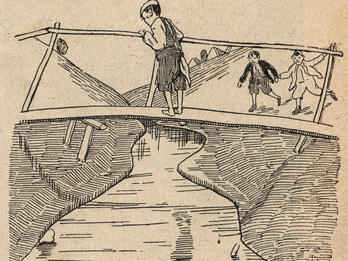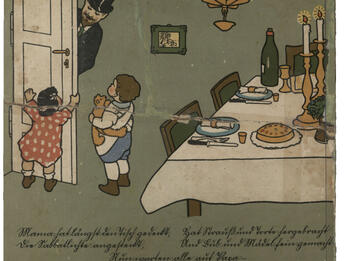In the City and in the Forest
The Waters of Strife (Meribah)1
What is it between me and you, O man of God, that you have come to me to remind me of my sin? (1 Kings 17:18)
Drops of oil fell into the pitcher of water. A clamor and a tumult arose there, and the waters grumbled on account of the guests who had come to sojourn in their midst and to settle on their property.
“Please, brothers!” pleaded the drops of oil. “Why do you resort to strife? Is there not enough space to contain us? Or are we not honorable enough for you? Are we not the Children of Yitshar [olive oil]?”2
“Indeed so,” answered the water in the pitcher. “You would honor us if you would only mingle among us and be like us; but that is not what you mean, for you sit on high, on top of our face in the high place of the pitcher, and by your shining appearance and your fragrant odor that wafts from a distance you remind us of our shame, that we are only drops of water, and we come from the Valley of Akhor [Trouble].3 Depart from us, for you are too mighty for us!” [ . . . ]
The Dream and Its Interpretation
“All dreams follow after the mouth” (b. Berakhot 55b).
The lion [king] lay down to rest with an empty stomach; he dreamed a dream and awoke. His spirit was stirred and he issued a decree that they announced in the forest, saying: “It is the king’s wish that all the elders of the forest should gather—its sages and magicians—and that they should interpret the king’s dream!” They did not delay in coming; the fox and the bear came, and also the donkey, for he was also wise in his own eyes. And by chance—we know not the reason—there was also an innocent lamb among those that came.
“Interpretations are by God!” The donkey jumped to the fore. “Let the king tell the matter of his dream!”
But lo, a predicament! The king forgot his dream.
“Onward, blasted by the east wind!” spoke the king trembling. “And you, O wolf! Tell me my dream and its interpretation! If not, my anger will be kindled against you.”
“My king, may it be well with you, my king!” began the wolf. And he said: “In your dream—behold, the earth was one great flock, and wolves were shepherding . . .”
“Swindler!” roared the lion in reply to him. “Will you pretend to be master of the flock?” And in a burst of rage he tore him to pieces.
When the bear saw that the wisdom of the wolf had been spoiled, he thought to himself and said:
“Let my speech be sweet to the king! What God is going to do, he has made known to our king in his dream. Evil days are about to come to the forest, and the shepherds will imprison their sheep, and our brethren will clash with one another, each one devouring the flesh of his fellow . . .”
“Are these your waking dreams?” the lion thundered angrily. “Will you wait for the days of troubles to rebel against your king?” And he tore the charmer to pieces.
It came the turn of the lamb. The innocent lamb heard the interpretations of the bear and the wolf, he saw their fate, and he understood his fate as well. He drew near and bowed before the king and came under his incisors.
And the face of the lion beamed.
“This is the dream and this is its interpretation!” answered the lion gleefully. And he accepted his sacrifice.
The Cowardice of the Donkey
For the first time in his life, the donkey saw the face of the lion, who was fast asleep. The donkey was amazed, and he said: “Indeed, the lions sleep as we do—their eyes are closed, and their legs are folded under their bellies—as the lion, so the donkey, they have one custom. Why, then, do they get such honor?”
“Empty head and full belly!” the dog called to him. “Once in your life you merited to see the radiance of the king’s face, and you only merited to see it in the moments when he was asleep! And now, know! Lions may sleep like donkeys, but when they are awake, they are lions. They may eat the same way as donkeys eat, but they hunt their prey like lions.”
Salamander
“What is with you, Mother?” Salamander inquired of the fiery flame in the furnace [see b. Ḥagigah 27a]. “What is with you, that you recoiled backward in shock? Are you expecting calamity, are you terrified of a sea gust? Have you not built a bulwark around you, so you should not fear the coming of destruction?”
“Ah, my daughter! I am afraid, lest the rays of the sun pierce through and I will be exposed as an imposter, for people will learn to distinguish between this daughter of heaven and your mother, born of the Inferno, and our disgrace will be manifest.”
“Baseless fear!” answered the daughter. “Behold, you have shielded yourself with a cloud, and with the pillars of smoke that surround you, you will smite with blinding light all in your vicinity; so that even if a spark of sunlight manages to slip in here, it will be obscured, and the eye, smitten with blindness, will not perceive it.”
Notes
[Deuteronomy 33:8.—Trans.]
[Numbers 16:1.—Trans.]
[Hosea 2:17.—Trans.]
Credits
Yehudah Shteynberg, from Ba-‘ir u-va-ya‘ar: Sipure-meshalim (fabelen) mekoriyim la-ketanim ve-la-gedolim [In the City and in the Forest] (Warsaw: Tushiyah, 1897), pp. 5, 8–10.
Published in: The Posen Library of Jewish Culture and Civilization, vol. 7.




